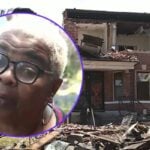Piles of bricks and debris lined the streets and sidewalks of the West End neighborhood in St. Louis after tornadoes ripped through the area on May 16, killing at least five people and damaging thousands of homes and businesses.
For longtime resident Bobbie White, the destruction was devastating. Her home was severely damaged, and she says her son’s house, just a block away, was left without a kitchen or bathroom after the back of the structure was torn off.
“My house was destroyed. My son’s house was destroyed,” she told First Alert 4 in a story published May 23.
Amid the community-led cleanup efforts and volunteer support, White says opportunists came circling.
Don’t miss
- I’m 49 years old and have nothing saved for retirement — what should I do? Don’t panic. Here are 5 of the easiest ways you can catch up (and fast)
- Gain potential quarterly income through this $1B private real estate fund — even if you’re not a millionaire. Here’s how to get started with as little as $10
- Robert Kiyosaki warns of a ‘Greater Depression’ coming to the US — with millions of Americans going poor. But he says these 2 ‘easy-money’ assets will bring in ‘great wealth’. How to get in now
“They got these vultures down here, talking about ‘Do you want to sell? Do you want to sell?’ I let them know: If I don’t send for you, don’t you come for me,” she said. “Licking your chops thinking you’re getting prime property for pennies on the dollar. That isn’t going to happen.”
Who are these types of buyers, and how can homeowners protect themselves in these situations if they’re asked to sell?
How the city is helping residents
St. Louis Mayor Cara Spencer says officials are working toward tackling such buying practices, according to the local broadcaster. One action the city has taken is to pause real estate tax sales and what Spencer called “land grabs.”
Still, homeowners may feel pressure to sell from so-called disaster investors. For those without adequate insurance — or who simply don’t want to rebuild — the offer of fast cash can be tempting, even if it’s far less than their property is worth.
Disaster investors are individuals or companies that purchase destroyed or damaged properties at discounted prices with the goal of salvaging them or flipping them for a profit. Some investors may claim they’re helping to rebuild devastated communities by assuming the financial risk of buying damaged properties, while critics call them exploitative.
Meanwhile, Central West End resident Ali Rand has created a grassroots movement to recruit volunteers and raise money to help St. Louis homeowners, according to First Alert 4.
“I’m going to do whatever it takes for it to stay my neighborhood and for my neighbors to stay here. Without them, what will happen to the City of St. Louis? That is my biggest fear. I cannot have the city fail,” Rand told the broadcaster.
Read more: Want an extra $1,300,000 when you retire? Dave Ramsey says this 7-step plan ‘works every single time’ to kill debt, get rich in America — and that ‘anyone’ can do it
What to do if you’re approached by a disaster investor
If someone offers to buy your home after a natural disaster, don’t rush into a deal — even if the offer sounds appealing. Here are a few things to consider first:
- Check your insurance: If your home is insured, your payout could cover repairs or even rebuilding (up to a policy limit).
- Don’t accept the first offer: In the wake of a disaster, you may initially get a lowball offer for your property. If you plan to sell, get a second opinion from a local real estate agent.
- Ask questions: What is the buyer’s plan for the property? Are they offering a fair price for the land value alone? If you’re unsure, consult with a housing counselor.
- Look into grants or relief programs: Government aid may be available to help cover temporary housing or emergency repairs.
- Consider your long-term goals: Selling for a quick payout may solve today’s crisis, but it could hurt your finances down the line.
As St. Louis works on recovery, residents like White and Rand are doing everything they can to fix their homes and protect their community.
“I will rebuild," White said firmly. “I haven’t worked 51 years for nothing.”
What to read next
- JPMorgan sees gold soaring to $6,000/ounce — use this 1 simple IRA trick to lock in those potential shiny gains (before it’s too late)
- This is how American car dealers use the ‘4-square method’ to make big profits off you — and how you can ensure you pay a fair price for all your vehicle costs
- Here are 5 ‘must have’ items that Americans (almost) always overpay for — and very quickly regret. How many are hurting you?
Like what you read? Join 200,000+ readers and get the best of Moneywise straight to your inbox every week. Subscribe for free.
This article provides information only and should not be construed as advice. It is provided without warranty of any kind.
